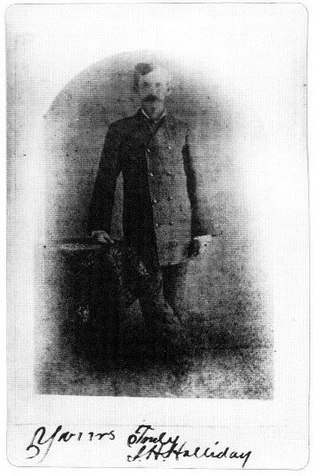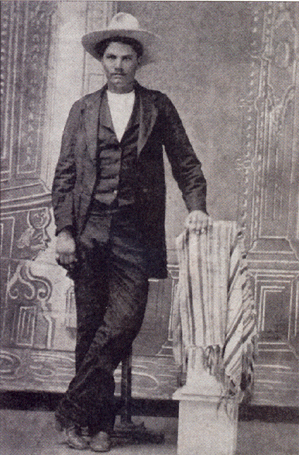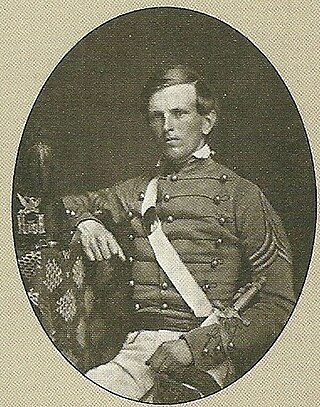
John HenryHolliday, better known as Doc Holliday, was an American gambler, gunfighter, and dentist. A close friend and associate of lawman Wyatt Earp, Holliday is best known for his role in the events leading up to and following the Gunfight at the O.K. Corral in Tombstone, Arizona. He developed a reputation as having killed more than a dozen men in various altercations, but modern researchers have concluded that, contrary to popular myth-making, Holliday killed only one to three men. Holliday's colorful life and character have been depicted in many books and portrayed by well-known actors in numerous movies and television series.

James Butler Hickok, better known as "Wild Bill" Hickok, was a folk hero of the American Old West known for his life on the frontier as a soldier, scout, lawman, cattle rustler, gunslinger, gambler, showman, and actor, and for his involvement in many famous gunfights. He earned a great deal of notoriety in his own time, much of it bolstered by the many outlandish and often fabricated tales he told about himself. Some contemporaneous reports of his exploits are known to be fictitious, but they remain the basis of much of his fame and reputation.

Wyatt Berry Stapp Earp was an American lawman and gambler in the American West, including Dodge City, Deadwood, and Tombstone. Earp was involved in the famous gunfight at the O.K. Corral, during which lawmen killed three outlaw Cochise County Cowboys. He is often erroneously regarded as the central figure in the shootout, although his brother Virgil was the Tombstone City and Deputy U.S. Marshal that day and had far more experience in combat as a sheriff, constable, marshal, and soldier.

Virgil Walter Earp was both deputy U.S. Marshal and Tombstone, Arizona City Marshal when he led his younger brothers Wyatt and Morgan, and Doc Holliday, in a confrontation with outlaw Cowboys at the Gunfight at the O.K. Corral on October 26, 1881. They killed brothers Tom and Frank McLaury and Billy Clanton. All three Earp brothers had been the target of repeated death threats made by the Cowboys who were upset by the Earps' interference in their illegal activities. All four lawmen were charged with murder by Ike Clanton, who had run from the gunfight. During a month-long preliminary hearing, Judge Wells Spicer exonerated the men, concluding they had been performing their duty.

John Wesley Hardin was an American Old West outlaw, gunfighter, and controversial folk icon. Hardin often got into trouble with the law from an early age. He killed his first man at the age of 15, claiming he did so in self-defense.

David Allen Mather, also known by the nickname "Mysterious Dave," was an American lawman, gunfighter, and occasional criminal in the Old West. His taciturn personality may have earned him the nickname "Mysterious Dave". Mather served as a lawman in Dodge City, Kansas, and East Las Vegas, New Mexico Territory. He disappeared in 1885 and his precise fate is unknown.

Luke Lamar Short was an American Old West gunfighter, cowboy, U.S. Army scout, dispatch rider, gambler, boxing promoter, and saloon owner. He survived numerous gunfights, the most famous of which were against Charlie Storms in Tombstone, Arizona Territory and against Jim Courtright in Fort Worth, Texas. Short had business interests in three of the best-known saloons in the Old West: the Oriental in Tombstone, the Long Branch Saloon in Dodge City, and the White Elephant in Fort Worth.

A Western saloon is a kind of bar particular to the Old West. Saloons served customers such as fur trappers, cowboys, soldiers, lumberjacks, businessmen, lawmen, outlaws, miners, and gamblers. A saloon might also be known as a "watering trough, bughouse, shebang, cantina, grogshop, and gin mill". The first saloon was established at Brown's Hole, Wyoming, in 1822, to serve fur trappers.

The Long Branch Saloon was a well-known saloon in Dodge City, Kansas from about 1874 to 1885. It had several owners, most notably Chalk Beeson and gunfighter Luke Short. The establishment provided gambling and live entertainment, including Beeson's five-person orchestra. It was the scene of several altercations, shoot-outs, gunfights, and standoffs often associated with cattle towns in the American wild west. Most famous was the 1879 Long Branch Saloon Gunfight, in which Frank Loving killed Levi Richardson.

John Henry Selman was sometimes identified as an outlaw and sometimes a working lawman of the Old West. He is best known as the man who shot John Wesley Hardin in the Acme Saloon in El Paso, Texas, on August 19, 1895.

Elizabeth Thompson was a prostitute and dance hall girl who worked in Dodge City, Kansas and other frontier cattle towns during the 1870s. She later became famous as Squirrel Tooth Alice, madam of a brothel in Sweetwater, Texas.
Edward T. "Red" Beard, was a gambler and saloon keeper of the Old West.

Old Cowtown Museum is an accredited history museum located in Wichita, Kansas, United States. It is located next to the Arkansas River in central Wichita. The Museum was established in 1952, and is one of the oldest open-air history museums in central United States with 54 historic and re-created buildings, including a period farm and out-buildings, situated on 23 acres of land off the original Chisholm Trail. Cowtown is a combination of attraction, museum, living history site, and historic preservation project. It is a 501(c)(3) not-for-profit institution.

Josephine "Chicago Joe" Airey, was an Irish-born American prostitute, madam, and proprietor of brothels, dance halls, a variety theatre, and saloons in Helena, Montana. She eventually became the most influential landowner in Helena. She was known as "Chicago Joe" Hensley following her marriage to James T. Hensley.

Delano is a neighborhood located in Wichita, Kansas, United States. A mixed commercial and residential area on the west bank of the Arkansas River, it is home to Friends University, Riverfront Stadium, and Exploration Place, the Sedgwick County science museum.
Langford M. Peel, also known as Farmer Peel was a soldier,gunman, and gambler in the American Old West. According to his grave marker, Langford was born in Liverpool, England. At age 12 he enlisted in the U.S. Army with the approval and help of his mother and stepfather. At the age of 17, he enlisted as a bugler in "B' Company of the 1st US Dragoons under Captain Edwin Vose Sumner; Peel, still under 20 years of age, when he killed his first three Indians at the Battle of Coon Creek in 1846. In 1850 he killed two more near Fort Kearney Kansas and a sixth later. Peel "was the best specimen of 160 pounds, five feet, nine inches, naturally bright, clear headed and helpful always." Sgt. Percivel Lowe would go on to say that a "full set of such noncommissioned officers under a good commander would make a troop [ or company] invincible against any reasonable odds." At the time of his First Sergeant's honorable discharge from the army in 1854, Langford was married and had a two year old son living on the fort, named after his 1st Sgt: Percival Lowe Peel. He traveled to Leavenworth, Kansas; Salt Lake City; Nevada; and eventually to Helena, Montana.
Cattle towns were midwestern frontier settlements that catered to the cattle industry. The economies of these communities were heavily dependent on the seasonal cattle drives from Texas, which brought the cowboys and the cattle that these towns relied upon. Cattle towns were found at the junctions of railroads and livestock trails. These towns were the destination of the cattle drives, the place where the cattle would be bought and shipped off to urban meatpackers, midwestern cattle feeders, or to ranchers on the central or northern plains. Cattle towns were made famous by popular accounts of rowdy cowboys and outlaws who were kept under control by local lawmen, but those depictions were mostly exaggeration and myth.
The history of Wichita details the history of Wichita, Kansas from its initial settlement in the 1860s to the present day.
Waldo E. Koop (1920-1990) was a writer on the history of the American West, a researcher, and author of publications about Billy the Kid and "Rowdy Joe" Lowe.

Manning Marius Kimmel was a military officer who served on both sides of the American Civil War. He entered the United States Military Academy at West Point in 1853 and graduated in 1857. After initially fighting for the Union, he switched sides to the Confederacy, one of four West Point graduates to fight on both sides during the war. In the Confederate Army, he served as adjutant general and assistant adjutant general on the staff of generals Benjamin McCulloch and Earl Van Dorn, and as inspector general on John Magruder's staff. He was the father of Admiral Husband E. Kimmel, who commanded the United States Pacific Fleet during the Attack on Pearl Harbor.















